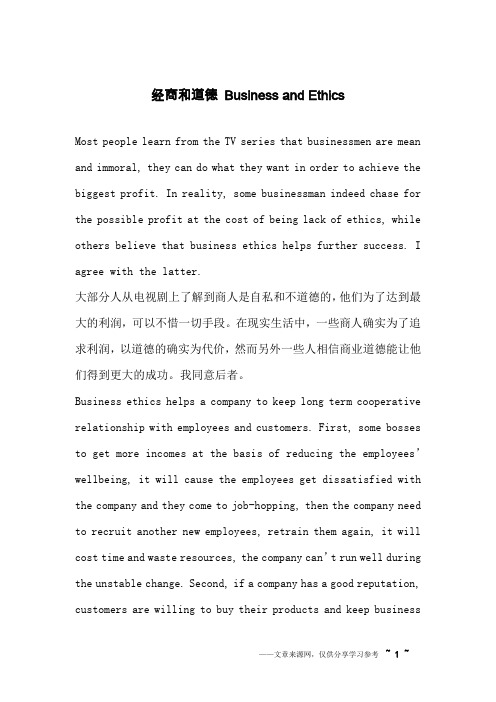CSR and BUSINESS ETHICS
- 格式:ppt
- 大小:142.00 KB
- 文档页数:16

经商和道德Business and EthicsMost people learn from the TV series that businessmen are mean and immoral, they can do what they want in order to achieve the biggest profit. In reality, some businessman indeed chase for the possible profit at the cost of being lack of ethics, while others believe that business ethics helps further success. I agree with the latter.大部分人从电视剧上了解到商人是自私和不道德的,他们为了达到最大的利润,可以不惜一切手段。
在现实生活中,一些商人确实为了追求利润,以道德的确实为代价,然而另外一些人相信商业道德能让他们得到更大的成功。
我同意后者。
Business ethics helps a company to keep long term cooperative relationship with employees and customers. First, some bosses to get more incomes at the basis of reducing the employees’wellbeing, it will cause the employees get dissatisfied with the company and they come to job-hopping, then the company need to recruit another new employees, retrain them again, it will cost time and waste resources, the company can’t run well during the unstable change. Second, if a company has a good reputation, customers are willing to buy their products and keep businesswith the company. On the contrary, no one is willing to buy the company’s products which is immoral, the product may be not in good quality, it will do harm to people’s health.商业道德能让一个公司和员工以及顾客保持长期的合作关系。




商业伦理作文英语Business Ethics。
Business ethics is the study of proper businesspolicies and practices regarding potentially controversial issues, such as corporate governance, insider trading, bribery, discrimination, corporate social responsibility, and fiduciary responsibilities. Business ethics is a form of applied ethics that examines ethical principles and moral or ethical problems that can arise in a business environment. It applies to all aspects of business conduct and is relevant to the conduct of individuals and entire organizations.One of the most important aspects of business ethics is corporate social responsibility (CSR). CSR is the idea that businesses should balance profit-making activities with activities that benefit society. This includes being environmentally friendly, providing fair wages and benefits to employees, and giving back to the community throughphilanthropic activities. Many companies today are judged not just on their financial performance, but also on how they contribute to society and the environment.Another important aspect of business ethics is the treatment of employees. It is important for businesses to treat their employees fairly and with respect. This means providing fair wages, safe working conditions, and opportunities for advancement. It also means not discriminating against employees based on factors such as race, gender, or sexual orientation.In addition to the treatment of employees, businesses also have a responsibility to their customers. This includes providing high-quality products and services, being honest in advertising and sales practices, and respecting customer privacy. Businesses should also strive to resolve customer complaints and issues in a fair and timely manner.Business ethics also extends to the relationships businesses have with their suppliers and partners. It isimportant for businesses to be honest and fair in their dealings with suppliers, and to ensure that their partners and collaborators adhere to the same ethical standards.Finally, business ethics also encompasses the behaviorof individuals within the organization. This includes avoiding conflicts of interest, maintaining confidentiality, and not engaging in insider trading or other unethical financial practices.In conclusion, business ethics is an important aspectof running a successful business. By adhering to ethical principles and practices, businesses can build trust with their stakeholders, including customers, employees, and the community. This can lead to long-term success and sustainability for the business, as well as a positive impact on society as a whole.Business Ethics in Action: The Case of Patagonia。

When writing an essay about company evaluations in English, its important to structure your thoughts clearly and provide specific examples to support your points. Heres a sample outline to help you get started:Title: Evaluating a Companys Performance: A Comprehensive Approach Introduction:Briefly introduce the concept of company evaluations.State the purpose of your essay and the key aspects you will discuss.Body Paragraph 1: Financial PerformanceDiscuss the importance of financial health in company evaluations.Include metrics such as revenue, profit margins, and return on investment.Body Paragraph 2: Customer SatisfactionExplain how customer satisfaction is a critical measure of a companys success.Mention customer feedback, reviews, and loyalty programs as indicators.Body Paragraph 3: Employee Engagement and RetentionHighlight the significance of employee satisfaction and turnover rates.Discuss how a companys culture and employee benefits can impact its performance. Body Paragraph 4: Innovation and AdaptabilityArgue the role of innovation in a companys ability to stay competitive.Provide examples of companies that have successfully adapted to market changes. Body Paragraph 5: Social Responsibility and EthicsDiscuss the impact of a companys social and ethical practices on its reputation and evaluations.Include points on corporate social responsibility CSR and ethical business practices. Body Paragraph 6: Market Position and Brand ImageAnalyze how a companys market position and brand image contribute to its overall evaluation.Discuss brand recognition, market share, and competitive advantages.Conclusion:Summarize the key points discussed in the essay.Emphasize the importance of a holistic approach to company evaluations.Suggest that a balanced view of financial, social, and operational factors is essential for afair assessment.Sample Essay:In the dynamic landscape of business, company evaluations are an essential tool for investors, stakeholders, and the companies themselves. This essay aims to explore the multifaceted approach to evaluating a companys performance, focusing on financial health, customer satisfaction, employee engagement, innovation, social responsibility, and market position.Financial performance is often the first indicator of a companys success. Metrics such as revenue growth, profit margins, and return on investment ROI provide a snapshot of the companys financial stability and profitability. However, a companys financial health alone does not paint the whole picture.Customer satisfaction is another critical measure, as it directly impacts a companys reputation and sales. Positive customer feedback, high ratings, and loyalty programs are indicative of a company that values its customers and is likely to experience sustained growth.Employee engagement and retention are equally important. A company with high employee turnover may struggle to maintain a consistent level of service and innovation. Conversely, a positive work culture and competitive benefits can lead to a more dedicated workforce, which in turn can drive company success.Innovation and adaptability are key to a companys longterm viability. Companies that embrace change and invest in research and development are better positioned to respond to market shifts and consumer demands.Social responsibility and ethical practices are increasingly important in todays global market. Consumers and investors alike are more conscious of a companys impact on society and the environment. A strong CSR program and adherence to ethical business practices can enhance a companys reputation and contribute to its overall evaluation.Lastly, a companys market position and brand image are integral to its success. A strong brand can command higher prices, attract top talent, and secure strategic partnerships. Market share and competitive advantages are also significant factors in determining a companys standing within its industry.In conclusion, evaluating a company requires a comprehensive approach that considersfinancial performance, customer satisfaction, employee engagement, innovation, social responsibility, and market position. By taking a holistic view, stakeholders can gain a deeper understanding of a companys strengths, weaknesses, and overall potential for success.。